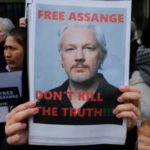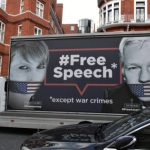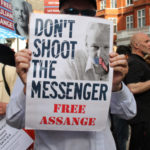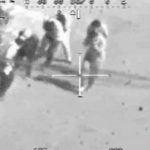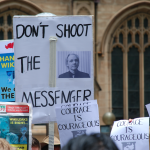“Beyond Obscene”: An Interview With Julian Assange’s Father John Shipton
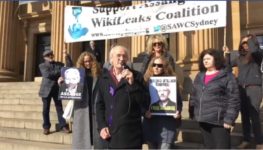
Australian journalist Julian Assange is currently being held in isolation in London’s notorious Belmarsh prison on a breach of bail conviction. And the Wikileaks founder is facing an extradition hearing in February, over 18 espionage charges in the US that add up to 175 years behind bars.
At a rally in support of Assange out the front of the London Home Office last week, renowned Pink Floyd musician and vocal social commentator Roger Waters performed a version of Wish You Were Here in support of Julian.
On introducing Waters, veteran Australian journalist John Pilger declared, “The behaviour of the British government towards Julian Assange is a disgrace: a profanity on the very notion of human rights.” And he added that this treatment is “the way dictatorships treat a political prisoner”.
Pilger made clear that the reason behind this is the “historic public service” that Assange performed in making documents leaked by Chelsea Manning public, which gave “millions of people facts on why and how their governments deceive them, secretly and often illegally”.
“We should all thank Julian”
After seven years of living in the cramped quarters of the Ecuadorian embassy in London, Assange was taken into custody by UK authorities on 11 April and subsequently arrested by the US by proxy. And since that time, his communications with his legal representatives have been overly restricted.
The UN special rapporteur on torture Nils Melzer has told reporters that “Assange shows all the symptoms of a person who has been exposed to psychological torture for a prolonged period of time”. And he added that Julian displays “severe psychological trauma” and his health is “critical”.
In 2016, when Assange was still confined to the embassy, US political commentator Noam Chomsky stated that Julian was being “being pursued with savagery”, because he “performed an enormous service to all the people in the world who treasure the values of freedom and democracy”.
According to Chomsky, Assange is persecuted for committing “the grave crime of exposing power to sunlight, which may cause power to evaporate if the population grasps the opportunity to become independent citizens of a free society, rather than subjects of a master that operates in secret”.
Bring Julian home
Since Julian’s incarceration in April, John Shipton, his father, has been campaigning tirelessly on behalf of his son and calling upon the Australian government to do more. However, besides regular consular assistance, prime minister Scott Morrison has said he’ll receive “no special treatment”.
No stranger to politics himself, Mr Shipton has long been an active anti-war protester. And back when Wikileaks was also a political party, he was its treasurer and secretary. Shipton’s currently in London waiting to visit his son in prison.
Sydney Criminal Lawyers spoke to John Shipton about Julian’s treatment in prison, the Australian government’s “complicity” in his son’s persecution, and how Julian’s legal team is set to fight his US extradition for as long as it takes.
Firstly, you’re currently in London waiting to visit Julian, who’s been incarcerated since April. Mr Shipton, what sort of conditions is your son being held under? And how is his health holding up?
His health is not good. He’s lost about 15 kilos in weight now – five since I last saw him. And he’s in solitary confinement for 22 hours a day, in the hospital ward of the gaol.
As you’ve just explained, Julian is being held in quite extreme conditions. He’s isolated from other inmates. And as well, his visits are restricted and so are his communications with his legal representation. Yet, he’s only being held for breach of bail, which is a rather minor charge.
Yes, very minor.
How are the UK authorities justifying the restrictions around his imprisonment seeing he’s being incarcerated on such a minor offence?
I don’t know if they feel the necessity to justify these decisions. Their decisions are arbitrary.
So, they’re giving no explanation as to his treatment.
No. And the judiciary at the level of the Magistrates Court tend to have a body of resentment against Julian.
Judge Phillips, in his summing up for the breach of bail, did a psychological evaluation, but Julian had only been in his court for five minutes. He didn’t give himself the opportunity to actually have anything other than an opinion.
Your son was taken from the Ecuadorian embassy in April…
Dragged from it.
Yes, and that was after having stayed there for seven years. What transpired seems to have been a coordinated operation between Ecuadorian, UK and US authorities. Mr Shipton, why do you think after so many years Julian was arrested at that moment?
The opportunity arose with the election of the Moreno government, who declared upon election that Julian was like “a stone in the shoe”.
The Americans approached the Moreno government, who were seeking an IMF loan. The Americans have veto power on the IMF board. The IMF loan was given to Ecuador upon the dragging of Julian out of the embassy.
The first tranche was paid immediately after Julian was dragged from the embassy.
Much criticism has been raised regarding the Australian government’s response to your son’s situation. Prime minister Scott Morrison has said he’ll receive regular consular assistance, but no special attention.
What do you think about how the Australian government is responding to the detention of one of its citizens’ in a foreign country?
Institutionally, they’re open for severe criticism. The Department of Foreign Affairs and Trade and the Defence Department have been intimately involved in Afghanistan and Iraq, where a million and half people have been killed.
And they, when questioning Julian, say that he endangered people’s lives. This is beyond obscene. It is incalculable. There are no words to describe it.
Further to that, they say that Julian dumped data, which in the first place is untrue. The data was dumped in a book published by the Guardian and written by David Leigh and Luke Harding. It gave the passphrase for the cache. All the data was dumped by the Guardian.
But, secondly, why are we the public restricted from evaluating data. We ought not to be. In both cases, one is crude and the other is obscene.
What further help should the Morrison government be providing Julian?
Diplomatic help. There’s the Stefania Maurizi freedom of information releases out of the Crown prosecuting authority in the UK, where it is declared the Swedish prosecuting authority wanted to cancel the case in 2013.
Paul Close from the Crown Prosecution Service wrote back and said, “You’re not getting cold feet on this, are you?”. There was another letter saying this is not simply about extradition. And a third letter goes further to demonstrate that the Crown Prosecution Service resisted finalisation of the case.
And further on from that, it’s now nine years and four prosecutors in the Swedish Prosecution Authority, two interviews and no charges have been laid.
The sexual misconduct allegations are kept alive as a gift that keeps on giving. It is just a scandal. The Australian government at any given time could have stopped that.
Alexander Downer was walking along the street. And a friend of mine approached him and said, “What are you going to do about Julian Assange.” And Downer’s reply was, “He’s not our concern. He is now an Ecuadorian citizen.”
Your son has received numerous journalism awards around the globe. And he’s hailed as a hero by a multitude of people for what he has achieved with Wikileaks. Yet, there has been a widespread smear campaign regarding him in the press. What do you say is at play here?
The progressive mobbing and smearing is addressed by Nils Melzer, the UN special rapporteur on torture, as a deliberate act in order to reduce his public standing, so that there would be little resistance to extraditing him to the United States and he being charged under the 1917 Espionage Act.
It is a deliberate policy, which, unfortunately, the Australian government has seen fit to involve itself in complicity and, under certain circumstances, it may be seen as active involvement, as I just quoted from Alexander Downer, who was the High Commissioner here.
Much has been reported on the lack of access that Julian has had to his legal representatives since he was sent to prison. What are the circumstances around this at present?
The legal team under Gareth Peirce has made approaches to have those circumstances modified.
And what are the current expectations for the US extradition hearing set for next February?
I can quote Gareth Peirce, who is a renowned human rights lawyer here. In speaking to the Metropolitan police commissioner, she said, “If you arrest Assange, we will fight this until the end of time.” So, that will be the legal team’s approach.
They will fight the extradition in the courts – and appeal, and appeal, and appeal. If necessary, they will take it to the European Court of Human Rights.
It will be three to five years fighting. And, unfortunately, it seems the UK government want to keep Julian in gaol during that period. This, again, can be modified with the assistance of the Australian government.
And if he was brought home, our court system is robust enough to handle an extradition request from the United States. Another thing we would demand from the Australian government, when Julian is to return home is that there be no extradition to the United States.
And that’s the best case scenario from here?
Yes. That the Australian government involve itself diplomatically in this matter.
A pall of shame would fall upon the Australian body politic should Julian be extradited to the United States and locked up for 175 years.
It would be a pall of shame. It would take a generation to overcome.


